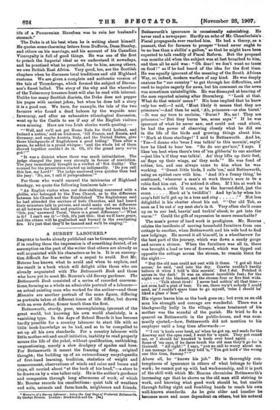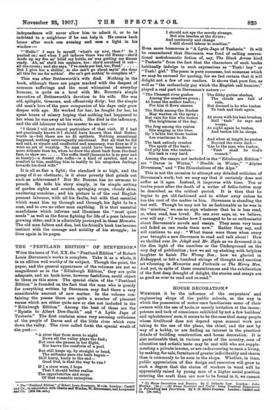A SURREY LABOURER.*
SEQUELS to books already published can be tiresome, especially if in reading them the impression is of something denied, of an assumption on the part of the writer that others are already as well acquainted with his characters as he is. It is an assump- tion difficult for the writer of a sequel to avoid. But Mr. Bourne has known what to avoid and when to explain, and the-result is a book which will delight alike those who are already acquainted with The Bettesworth Book and those who have yet to meet Mr. Bourne's old Surrey gardener. The Bettesworth Book consisted of a series of recorded conversa- tions•, forming as a whole an admirable portrait of a labourer— an actual existing man who worked for the author—and these Memoirs are another portrait of the same figure, differing as portraits taken at different times of life differ, but drawn with an even defter, firmer touch than the first.
Bettesworth, sturdy, poor, uncomplaining, ignorant of the great world, but knowing his own world absolutely, is a vanishing type. In the days of School Boards it has become hardly possible for a country labourer to start life with so little book-knowledge as he had, and so to be compelled to set up all his own standards. For a count►y labourer with little mother-wit and small initiative, inability to read properly means the life of the yokel, without qualification, unthinking, unquestioning, merely a slow drudgery of spades and hoes. For Bettesworth it meant the framing of deep, original thought ; the building up of an extraordinary encyclopaedia of first-hand learning, tradition, statistics of weight and measurement, observations of winds and rains and loams and clays, all carried about "at the back of his head,"—a store to be drawn on by a wise talker only. He is the author's gardener and companion through long afternoons of work, of which Mr. Bourne records his recollections: quiet talk of weathers and soils, animals and farm-hands, neighbours and friends.
• Memoirs Oa Surrey Labourer : being the Last Days of Frederick Bettesloorlh. By George Bourne. London : Duckworth and Co. Lbe.) Bettesworth's ignorance is occasionally astonishing. He never read a newspaper. Hardly an echo of Mr. Chamberlain's Fiscal propaganda ever reached him. He had a theory, as a peasant, that for farmers to prosper "bread never ought to be no less than a shillin' a gallon," so that he might have been expected to talk readily of Fiscal Reform. But the proposal was months old when the subject was at last broached to him, and then all he said was : " Oh dear! we don't want no taxes'
on food !" as if he had heard of the idea for the first time. He was equally ignorant of the meaning of the South African War, or, indeed, modern warfare of any kind. He was deeply anxious for " our country" to get through her difficulties, and used to inquire eagerly for news, but his comment on the news was sometimes unintelligible. He was dismayed at hearing of
the men reported missing after Stormberg. "'Look at that. What do that missin mean?' His tone implied that he knew only too well.—I said, Most likely it means that they are prisoners.'—And then he said, ' Ah, prisoners—or else burnt.'
—It was my turn to exclaim, Burnt ? No, no ! They are prisoners.'—' But they burns 'em, some says.' " If he was ignorant of what he never saw, and could not read about, he had the power of observing closely what he did see in the life of the birds and growing things about him.
" Hark at those starlings ! I said to Bettesworth. And he,
Yes—I dunno who 'twas I was talkin' to this mornin', sayin' bow he liked to hear 'em. "So do our guv'nor," I says. I
likes 'em best when there's two of 'em gibberin' to one another —jest like 's if they was talkin'. An' they lifts up their feet, an' flaps up their wings, an' they nods.'" He was fond of robins, too, and one always came to him when he was working. " ' Sweet little birds, I calls 'em,' said Bettesworth, using an epithet rare with him. And it's a funny thing,' he continued, wherever a man's at work there's sure to be a
robin find him out. I've noticed it often. If I bin at work in
the woods, a robin 'd come, or in the harvest-field, jest the same Hark at 'n twiddliti! And by-'n-by when his crop's full he'll get up in a tree and sing '" Not less delightful is his chatter about his cat. "`Our old Tab, as soon as I be out o' my nest she's in it. Very often she'll come
up on to our bed, heavin' and tuckin' about, to get into the warm.' " Could the gift of expression be more remarkable ?
The man's power of hard work is prodigious. Mr. Bourne relates the incidents of moving household furniture from one cottage to another, when Bettesworth and his wife had to find new lodgings. He moved it all himself, in a wheelbarrow for
the best part of the journey, which was down a sandy gorge and across .a stream. When the furniture was all in, there was brought a load or two of firewood, which was tipped out opposite the cottage across the stream, to remain there for the night :— " But the old man could not rest with it there. 'I got all that across,' he said, and into the dry. Crawte couldn't hardly believe it when I told 'n this mornin'. But I did. Fetched it across in the dark.' It was an almost incredible feat; for the night was of the blackest, and the stream four or five feet wide.
Talk about tired I never had nothin' all that time— not even half a pint of beer. Ye see, there wa'n't nobody I could send, an' I couldn't spare time to go myself, 'relse I should ha' liked a glass o' beer."
His vigour leaves him as the book goes on; but even as an old man his strength and courage are wonderful. There was a blackguardly bully in the village, whose treatment of his mother was the scandal of the parish. He tried to fix a
quarrel on Bettesworth in the public-house, and was sum- marily ejected,—how, Bettesworth did not mention to his employer until a long time afterwards :- "' cut 'n heels over head, an' when he got up, and made for the doorway and the open road, I went for 'n again. They got round me, or I should ha' knocked 'n heels over head again Some of 'em says, if he dares touch the old man they'd go for 'n theirself. "All right !" I says, "you no call to worry about me. I can manage he." And they told 'n, "You got hold o' the wrong one this time, Sammy."' " Above all, he "knows his job." He is thoroughly con- temptuous of ignorance in others of what belongs to their work; be cannot put up with bad workmanship, and it is part of the skill with which Mr. Bourne chronicles Betteaworth's increasing age that he shows us the old man still striving to work, and knowing what good work should be, but unable through failing sight and fumbling bands to reach his own well-known standards. As he gets older and lonelier he becomes more and more dependent on others, but his natural
independence will never allow him to admit it, or to be indebted to a neighbour if he can help it. He comes back home after work one evening and sees a light in his
window -
"'Hullo !' I says to myself, 'what's up now, then ?' So I pushed on; and when I got indoors there was old Nanny—she'd made up my fire an' biled my kettle, an' was getting my dinner ready. Ah, an' she'd bin upstairs, too : she'd scrubbed it ent- ail the rooms ; and she says, I've made yer bed, too, Fred: But I give her a shillin', so she can't go about sayin' she done all this for me for nothin'. She en't got nothin' to complain of."
This was after Bettesworth's wife died. Nothing in the
book, although there are pages marked with the deepest of common sufferings and the most whimsical of everyday humour, is quite on a level with Mr. Bourne's simple narrative of Bettesworth's devotion to his wife. She was old, epileptic, tiresome, and offensively dirty; but the simple old man's love of the poor companion of his days only grew deeper with age. He worked for her, he fought for her, he spent hours of misery hoping that nothing had happened to her when he was away at his work. She died in the infirmary, and the old labourer took his master to see her :- "I think I will not record particulars of that visit. If I had not previously known it I should have known then that Bettes- worth is—but there are no fit epithets. Nothing sensational happened, nothing extravagantly emotional. But all that he did and said, so simple and unaffected and necessary, was done as if it were an act of worship. No man could have been tenderer or more delicate than he, when he drew the sheet back from the dead face, to show me... ... The coffin itself (because he is so poor and so lonely)—a decent elm coffin—is a kind of symbol, and so a comfort to him, enabling him to testify to his unspoken feelings towards his dead wife."
It is all so fine a fight ; the standard is so high, and the grasp of it so obstinate; is it sheer poverty that grinds out
such an achievement P But Mr. Bourne has no sermons to preach. He tells his story simply, in its simple setting of garden sights and sounds, springing crops, cloudy skies, sweltering sunshine ; and his picture is of the real English peasant labourer, with all his faults, but with that essential which sums him up through and through, his fight to be a man, and to owe no other man anything. It is that essential manfulness which informs and illumines the "most quiet needs " as well as the fierce fighting for life of a poor labourer
growing older, and it is admirably portrayed in these Memoirs.
The old man falters and dies, but his friend's book has become instinct with the courage and nobility of his struggle ; he lives again in its pages.



















































 Previous page
Previous page